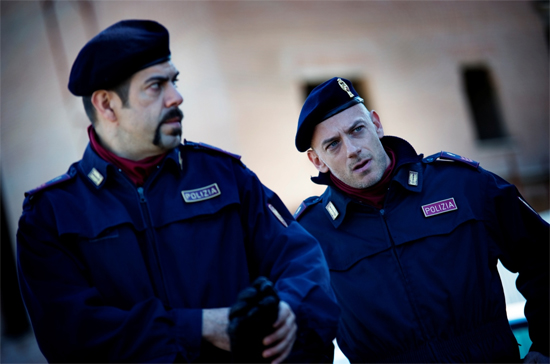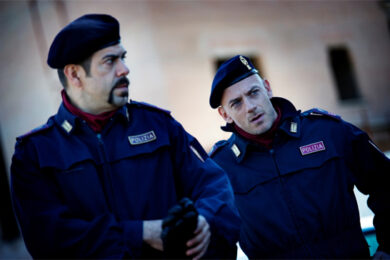A banner was put up in the Curva Sud end of Roma football club’s stadium the other week. Italian ultras tend to express their feelings much more through the written word than with spontaneous chanting, especially with matters political, and this one had something to say about the police, the fans’ sworn enemy. It read: ‘Federico [Aldrovandi], Stefano [Cucchi], Gabriele [Sandri] and many others… A.C.A.B. isn’t a film’, referring to the deaths of those three young men at the hands of the police*, and the controversial movie of the same name. Shortly after ‘Bonino merda’ was raised in honour of Carlo Bonini, the author of the book on which the film is based. At Genoa v Napoli the same weekend another banner read: ‘Your career is beating up people in handcuffs, we’ve had enough with your abuse of power: infami!’ [‘Infame/i’ is a word that is notoriously hard to translate – it’s not ‘infamous’, Google translators. An ‘infame’ is a vicious expletive for the sort of person who acts in bad faith, who would look after your house while you were on holiday and sell all your possessions, drown your cat and take all your money.] Football fans up and down the country have been extremely vocal, after a fashion, in expressing their anger about this film, which they consider to be little more than propaganda for a brutal, repressive organ of the state. And even though none of them have seen it, nor will be going to see it, they’ve got a point.
In case you didn’t know, A.C.A.B. is an acronym for All Cops Are Bastards – a popular slogan across Europe, particularly among the far left/right and football ultras. It has huge currency in Italy, partly because Italians see the police as little more than slaves protecting a corrupt, unjust state, but also because instances of police brutality are legion. The Reparto Mobile (otherwise known as the La Celere, or Celerini – riot police, basically, charged with maintaining public order) are ones usually dishing out the hits, and it’s with them that we find ourselves, following their lives and work. It’s a pretty grim line of work too. We see them holding back protesting trade unionists from Sardinia from going to their demonstration in the capital; throwing people out of their homes on the council’s orders; standing on guard – and stopping a riot from furious, racist locals – as an illegal Romanian gypsy camp is destroyed following a rape; and fighting with rioting football fans. They deal with a hostile public, and are often at risk of attack: at the Occupy Rome marches in the autumn the police took a terrible hiding from a well-organised minority of protesters (many of whom were football ultras), who pelted them with rocks and set fire to police vans while officers were still inside. This all took place over several hours at Piazza San Giovanni, at the southern edge of the old city walls. The police, who have been subject to savage cuts in budget and pay themselves, were the target, while the parliament building – the nexus of everything that is wrong with this country – was left undisturbed. That says something about Italian society that I’m not quite sure I can articulate. But it’s depressing, all the same.
Given all the aggravation a Celerino puts himself in line for, a certain type of person (poor, white, right wing and angry) gravitates towards the work, and the results are frequently not good for Joe Public. Beatings are common, and while football thugs looking for trouble are usually on the receiving end of a baton (and the first to complain about it), just as often complete innocents get the treatment. Recently Rome’s director of public prosecutions called for the arrest of officers who savagely beat Roma fan Stefano Gugliotta outside the Stadio Olimpico after the 2010 Italian Cup Final. Gugliotta was sat on his scooter when he was repeatedly struck and then arrested for trying to get away. Below is a video of the incident, which has been doing the rounds on YouTube.
Bonini’s book was written in 2009, a year before the attack, but there are eerie echoes of the Gugliotta case in Stefano Sollima’s adaptation. When we see the film’s main protagonist Cobra (Pierfrancesco Favino) in court, he is charged with assaulting a young lad, who like Gugliotta had his teethed knocked out by a swinging baton outside the Olimpico. He smiles Gugliotta’s crooked smile in the courtroom, and testifies that he was beaten for no reason. Cobra, who is an officer in the Reparto Mobile, takes the stand and asks, ‘Do you think that smacking people in the face is something that I like to do?’, before explaining how hard it is to decide who is and isn’t innocent on the front line, how the adrenaline pumps and everything is chaos. It also turns out that the young victim was actually involved in a full-blown riot in which several police officers were severely hurt, and therefore fully deserving (according to Cobra – and Bonini) of his smack round the chops. Gugliotta, it should be noted, not only wasn’t involved in any rioting, he hadn’t even been at the game, and was only in the area as a result of celebrating Roma’s win with his cousin. "The hardest hit," he said at at the time, "came after I told them: ‘It’s nothing to do with me.’"
It’s stuff like that court scene that makes A.C.A.B. a slippery film: it makes no attempt to hide either the viciousness or the moral bankruptcy of the Celerini, while also pitching them as officialdom’s Travis Bickles, gamely and heroically holding back the scum with shields, sticks and helmets. Our anti-heroes are all Roman riot police and each have the standard issue policeman problems: Cobra is a violent renegade who cares only about his ‘brothers’; Mazinga (Marco Giallini) has a runaway son hanging around a mosque occupied by Neo-Fascists; Negro (Filippo Nigro) has been booted out of his home by his soon-to-be ex-wife (who is black, hence the nickname) and mother of his daughter; there’s more, but you get the idea. Cobra sports a huge Celtic cross on his back, and his friend Carletto, a former Celerino himself, has a portrait of Benito Mussolini hanging on his living room wall. The plot loosely hangs off the stabbing of Mazinga by a Roma hooligan during fighting between Romanisti and Napoli fans. He has his truncheon stolen by a hooded assailant, sparking a search for both his gear and revenge by his brothers. From here we’re taken through Rome’s grotty underside of petty crime, drug dealing Africans, rapist Romanian gypsies, flat-stealing immigrants (spotting a theme here?), neo-Fascist squats and knife-wielding football thugs. Director Sollima, who is best known here for the superb TV series Romanzo Criminale, captures working class Rome brilliantly. We are a long way from the Trevi Fountain, deep in a world of grim, grey neighbourhoods, substandard council housing and grinding poverty. Where immigrants and Italians do not get on, and where violence hums in the background, behind the constant whirring of second-hand scooters. Night scenes are particularly gloomy, with the city’s atrocious street lighting barely illuminating the characters and neatly camouflaging scuttling delinquents.
However, despite all this grit and grime and brutality, the solid performances and authentic atmosphere of an old city gripped by an identity crisis, there’s something missing. That something is the truth. The lie behind A.C.A.B. – that the Celerini are honourable men (in their own, corrupt, way) doing their best in a difficult situation – becomes apparent when the film tries to deal with real world events. The atrocities at the Diaz-Pascoli and Diaz-Pertini schools during the 2001 G8 summit in Genoa, where protesters were kept prisoner, stripped, beaten and tortured by police, is described by Cobra as "the biggest fuck up" ever committed by the police. But it wasn’t a fuck up. It was an act of outrageous, premeditated violence against non-violent demonstrators, which left 60 people with severe injuries, including three in comas and one with permanent brain damage. In nearly all of the incidents in which our anti-heroes resort to violence, there is always an explicit justification: they are either spat on, attacked or simply getting revenge for something done to one of their brothers. This rings hollow for anyone who has had to deal with the police here. They’ll hit you hard and then pretend you had a molotov cocktail on you.
More important, though, are the scenes of football violence, which are so laughably bad, so unrealistic, that they recall the Liverpool v Man United fixture in The 51st State. When Roma and Napoli fans somehow managed to get out of the stands mid-game in order to fight (an impossibility, I can tell you), the police find themselves outnumbered and surrounded. Despite there being no police presence worthy of the name, both sets of hooligans – some of the most violent in the country – only lob a few stones (instead of stabbing each other, which is what usually happens), before targeting the poor, beleaguered police. There is simply no way that a fight of this nature, so close to the stadium, could happen without there being hundreds of riot police charging everywhere and cracking heads, even if you allow for the fact that the Napoli fans could never find their way out of the away end in the first place. It is a scene engineered to make the police look like victims, stuck in the middle and struggling to hold back the tide as the country collapses around them. It is a lie, and it’s why the prominence of immigrants feels so snide. Rome is incredibly white for a major European capital, yet watching A.C.A.B. you would think that the Italian population was being overrun.
Last month the police raided a housing block in Romanina, a rough working class neighbourhood just like the ones depicted in A.C.A.B., at the extreme south-east of the city. In one of the flats they found thousands of euros of cash, an ostentatious home that also contained gold taps, drugs and weapons. Outside the block were gang affiliates who made sure that no one unknown came through the gates. The gang is one of the most powerful in the city, and has around 1000 associates working for them. They basically run the drug dealing in south Rome, out towards the Castelli Romani and around other parts of the Lazio region, and also indulge in loan sharking, illegal gambling, credit collection and money laundering through legitimate businesses, some of which they own. The clan’s name is not Tewolde, or Mouataz, or Cheung, but The Casamonicas, and comes from a settled Italian Sinti family which has been in Rome since they moved here from the Abruzzo region in the 1970s. The Sicilian Mafia, the Neapolitan Camorra and the Calabrian ‘Ndrangheta (a lesser known but extremely powerful mafia organisation – they have basically taken over Milan) all have a presence too. Here is where we fall down: for a film purporting to be a trip into the life of the Roman working class, a piece of cinematic realism, A.C.A.B. ignores so many basic truths that the only thing it leaves is a bad taste in the mouth.
*Aldrovandi was beaten to death by for police officers in 2005 in Ferrara. Cucchi was ‘found dead in police custody’ in Rome after being banged up for five days for possession of weed, his body covered in an inexplicable number of bruises. In November 2007, Lazio fan Sandri was shot dead by Highways Police officer Luigi Spaccarotella as he sat in the back of his friends car, which was speeding away from a fight between Lazio and Juventus fans at the Badia Al Pino service station in Tuscany. They were on their way to see Lazio play at Inter in Milan.
For more information check the A.C.A.B. website.





